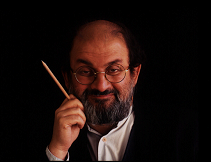The world famous writer Salman Rushdie is once again in the mire of the media with his last book Fury, which describes New York City in ruins. He must have had a premonition because a few days after its publication, television showed an image of New York, after a terrorist attack, exactly like the apocalyptic vision of the city in Rushdie' s vision. But it is not the first time Salman Rushdie creates a controversy with one of his book...
Salman Rushdie is an Anglo-Indian novelist. He's especially famous for his Satanic Verses, written in order to fight against religious fanaticism. He has been harassed by Islamism people, some of them even offered rewards of millions of dollars against his death. Salman has lived in England the major part of his life, hiding from assassins. Nevertheless, he left London in 1999 for New York, where he continues writing.
Salman Rushdie was born in Bombay in a Moslem middle class family in 1947. At the time, India gained its Independence from England, and important religious clashes between Indians and Pakistanis began. In 1961, he was sent to England for his studies. He lived there for 7 years, and returned for a while to Pakistan, where his parents had exiled with other Muslims. He had a few jobs, such as working for television. Then he became an actor at theater and as a freelance advertising copywriter.
He made his debuts as a novelist in 1975: he wrote his first novel: Grimmus. With Midnight's children written in 1981, Salman won the Booker Prize, the literary award from English Speaking Union; and James Tait Black Memorial Prize, which allowed him to be famous all over the World. Two years after, with Shame, Salman Rushdie won the "prix du meilleur livre étranger".The scandal began in 1988 with the publication of the Satanic Verses, written in order to fight against religious fanaticism, Koran and fundamentalists. Though he won the "Whitebread award", thanks to his book, it caused reactions all over the World. In India and South Africa, the novel was banned, even in Europe, some Muslims burnt it, as in Yorkshire. If Salman has to move constantly, change living place every three months, it's due to the fatwa ordered by Ayatollah Khomeini. This Iran's former leader sentenced him to death, promising one, and then two million dollars for the one who would kill him. He said: "I inform the proud Muslim people of the world that the author of the Satanic Verses book which is against Islam, the Prophet and the Koran, and all involved in its publication who were aware of its content, are sentenced to death." Salman, since then, is living hiding from assassins, protected by Interpol. Despite the danger, he still defends freedom of expression: "What is freedom of expression? Without the freedom to offend, it ceases to exist."
In 1999, Salman decided to immigrate to The States. As he said in an interview: "In fact, I've always wanted to live in New York. A long time before the fatwa." Previously, his life kept him away from this town, but now he doesn't want to hide himself from no one anymore and he has chosen to live there. What Salman was attracted by in living in N.Y is the fact that it's an immigrant city: people come from all over the World, and even from the USA. It is the perfect place, according to him, to discover new cultures. And, as he affirms: "NY is a slice of the World". Moreover, the author was expecting to find inspiration for a new book, in a town he particularly loves, where he feels "at home". As a result: Fury, a book full of criticisms towards the States.
We chose Salman Rushdie because he's constantly on the move, trying to stay alive. In fact he migrated three times to finally arrive in New York in 1999. We could notice that this person is really brave because of the Khomeini's fatwa: Instead of keeping silent, he's still writing even if he knows his life in danger, and even decided to show himself, and accept interviews. His premonition for the events of September, 11; permitted him to draw the public's attention one again…
Claire, Célia, Vanessa, 1ère S, 2001-2002
